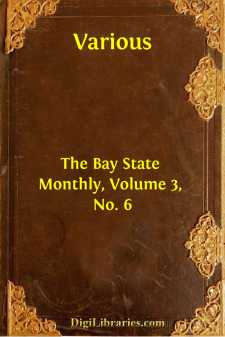Categories
- Antiques & Collectibles 13
- Architecture 36
- Art 48
- Bibles 22
- Biography & Autobiography 813
- Body, Mind & Spirit 142
- Business & Economics 28
- Children's Books 17
- Children's Fiction 14
- Computers 4
- Cooking 94
- Crafts & Hobbies 4
- Drama 346
- Education 46
- Family & Relationships 57
- Fiction 11829
- Games 19
- Gardening 17
- Health & Fitness 34
- History 1377
- House & Home 1
- Humor 147
- Juvenile Fiction 1873
- Juvenile Nonfiction 202
- Language Arts & Disciplines 88
- Law 16
- Literary Collections 686
- Literary Criticism 179
- Mathematics 13
- Medical 41
- Music 40
- Nature 179
- Non-Classifiable 1768
- Performing Arts 7
- Periodicals 1453
- Philosophy 64
- Photography 2
- Poetry 896
- Political Science 203
- Psychology 42
- Reference 154
- Religion 513
- Science 126
- Self-Help 84
- Social Science 81
- Sports & Recreation 34
- Study Aids 3
- Technology & Engineering 59
- Transportation 23
- Travel 463
- True Crime 29
The Bay State Monthly, Volume 3, No. 6
by: Various
Categories:
Description:
Excerpt
HENRY W. PAINE.
By Prof. William Mathews, LL.D.
Among the callings acknowledged to be not only useful, but indispensable to society, there is no one, except the medical, which has been oftener the butt of vulgar ridicule and abuse than the legal. "Lawyers and doctors," says a writer on Wit and Humor in the British Quarterly Review, "are the chief objects of ridicule in the jest-books of all ages." But whatever may be the disadvantages of the Law as a profession, in spite of the aspersions cast upon it by disappointed suitors, over-nice moralists, and malicious wits, it can boast of one signal advantage over all other business callings,—that eminence in it is always a test of ability and acquirement. While in every other profession quackery and pretension may gain for men wealth and honor, forensic renown can be won only by rare natural powers aided by profound learning and varied experience in trying causes. The trickster and the charlatan, who in medicine and even in the pulpit find it easy to dupe their fellow-men, find at the bar that all attempts to make shallowness pass for depth, impudence for wit, and fatal for wisdom, are instantly baffled. Not only is an acute, sagacious, and austere bench a perilous foe to the trickery of the ignorant or half-prepared advocate, but the veteran practitioners around him are quick to detect every sign of mental weakness, disingenuous artifice, or disposition to substitute sham for reality. Forensic life is, to a large extent, life in the broad glare of day, under the scrutiny of keen-eyed observers and merciless critics. In every cause there are two attorneys engaged, of whom one is a sentinel upon the other; and a blunder, a slip, an exaggeration, or a misrepresentation, never escapes without instant exposure. The popular reputation of a lawyer, it has been well said, is but the winnowed and sifted judgment which reaches the world through the bar, and is therefore made up after severe ordeal and upon standard proof.
These observations are deemed not inappropriate as an introduction to a sketch of the life of one of the most eminent lawyers of New England, whose career may be regarded as signally worthy of imitation.
Henry William Paine was born August 30th, 1810, in Winslow, Maine. His father, Lemuel Paine, a native of Foxborough, Mass., was a graduate of Brown University, and a lawyer by profession, who began practice in Winslow, Maine, in partnership with Gen. Ripley, afterwards the hero of Lundy's Lane. Owing to poor health, Mr. Paine, sen., soon abandoned the law for other pursuits. He was familiar with the representative English authors, and specially fond of the Greek language and literature, which he cultivated during his life. He had a tenacious memory, and could quote Homer by the page. Henry Paine's mother, Jane Thomson Warren, was the daughter of Ebenezer T. Warren, of Foxborough, the brother of General Joseph Warren, who fell at Bunker Hill. Of the three children of Lemuel and Jane T. (Warren) Paine, Henry William was the second....












